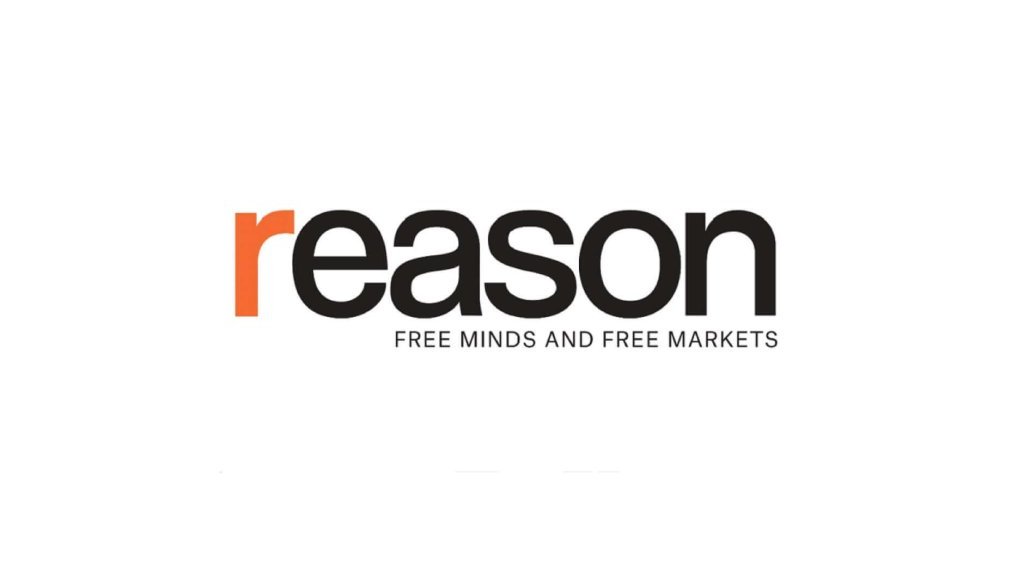From Big Gulps to Raw Milk: The Rise of MAHA
Today’s guest is Elizabeth Nolan Brown, whose recent Reason cover story looks into the politics of the Make America Healthy Again (MAHA) movement spearheaded by Health and Human Services secretary Robert F. Kennedy Jr.
Just a decade or so ago, it was Democrats, liberals, and progressives who were pushing healthy eating initiatives and it was common to see Republicans and conservatives like Sarah Palin brandish Big Gulps like AR15s and Fox News anchors like Sean Hannity declare their loyalty to Kentucky Fried Chicken.
But now the Trumpian right is embracing wellness and food purity like nobody’s business–and is using the state to enforce its preferences.
Nick Gillespie talks with Brown about how we got here, where it’s headed–and whether you’ve eaten your last red M&M.
This episode was recorded live in front of an audience in New York City. Go here to get information about upcoming events, including the Reason Roundtable live in New York on July 15!
0:00 – Intro
1:17 – What is MAHA?
4:51 – The right used to scoff at wellness
11:31 – Processed foods were once desirable
13:13 – Liberals were first to embrace ‘farm to table’
15:21 – What led to the right’s embrace of healthy living?
23:52 – Where libertarians and MAHA align
27:43 – How RFK Jr. won over the right
30:44 – Research quality of dietary recommendations
35:53 – Concerns about the MAHA movement
37:17 – School lunches and food stamps
40:14 – Tradwives
43:00 – Gender roles and MAHA
Upcoming Reason Events
The Reason Roundtable Live in NYC!, July 15
The Soho Forum Debate: Jacob Hacker vs. David Goldhill, July 16
Today’s Sponsor:
Future of Freedom: If you’re tired of cable news debates and Twitter shouting matches, and you’re looking for serious, good-faith conversations between people who actually care about liberty, then it’s time to check out the Future of Freedom podcast. Each episode dives deep into a single topic—tariffs, campus speech, the Department of Government Efficiency—and brings together two guests who disagree on the best path forward. But here’s the twist: This isn’t a debate show. No interrupting. No dunking. If you believe the future of freedom depends on more than just winning arguments and you’re ready for something deeper than the usual echo chambers, check out the Future of Freedom podcast. Real disagreement. Real ideas. Real conversations. Subscribe to Future of Freedom wherever you get your podcasts.
______________________________________________________________________________
Transcript
This is an AI-generated, AI-edited transcript. Check all quotes against the audio for accuracy.
Nick Gillespie: Let’s start by define MAHA. How does it define itself, and what are its constituent parts?
Elizabeth Nolan Brown: I think MAHA is a state of mind because it means so many things. When I was researching this article, I just searched the MAHA hashtag on various social media to see what was defined as MAHA. I think of it as being about using tallow to cook your fries instead of seed oils. Or maybe skepticism about vaccines, on the other hand. But when you look at what people are describing as MAHA, it’s everything from banning food dyes, to getting people to exercise more, to functional medicine, to regenerative farming, to testing your air in your home for mold and toxins. Any sort of wellness fad of the past 40 years is kind of being lumped in as MAHA, right now.
What is regenerative farming?
Regenerative… Don’t let the future surgeon general Casey Means—or Callie Means, I forget which one is which.
It’s one of the Wonder Twins of alternative medicine.
It’s farming so that the soil, so that while you’re planting crops, it’s done in a way that the soil gives back and will be more healthy after you’ve planted in it than before.
Okay, that sounds…
Unobjectable…
I suspect people are doing that, yeah. So who gets to define MAHA? Because Robert F. Kennedy Jr., former Democratic presidential candidate—an independent presidential candidate— now secretary of Health and Human Services, is a big key figure in this. If Trump gets to say what “America First” means, does RFK Jr. get to define what MAHA is?
I think he’s the one who coined the term or started popularizing the term. But it was really him capitalizing on this already existing trend within conservative circles, which was that suddenly conservatives were starting to sound like old-school hippies — or like my friends that lived in Brooklyn in 2009 about this stuff. Suddenly, they were talking about cleansing your aura and eating without additives, and just all of the stuff that you think of as not belonging to the right at all. Especially since COVID, that ramped up. RFK just sort of capitalized on that and brought it all under this MAHA umbrella.
What is the connective tissue between, “okay, we’re going to eat healthy, we’re not going to eat corporate cereals that have petroleum-based food dyes in them, and we’re also going to be anti-vax?” Is there a controlling idea that motivates all of this?
Yeah. I think if there’s a loose thread underlying all of this, it’s skepticism of conventional health wisdom and health establishment authorities. So, skepticism of government health advice, skepticism of the big governing health bodies. And that’s why, at its core, it’s sort of refreshing from a libertarian standpoint. I’m not anti-vaccine. I am skeptical about some mainstream nutrition advice.
Like what? Can you give us an example?
Well, I guess now it’s not necessarily mainstream anymore, but the whole “eat carbs to lose weight and don’t eat saturated fat”—that kind of stuff.
So let’s talk a little bit about—you were saying what’s weird, or what’s notable about this, among other things, is that you have people who identify on the right, they’re conservatives, or they’re MAGA Republicans, who are talking like they belong to the Park Slope Co-op in 2009, right? And you, in the story—which is just kind of a great run-through of all this in an analysis—you bring up forgotten episodes where Sarah Palin, of all people, is slurping from a Big Gulp and saying, “From my cold, dead hands. Would you ever take this”?
She literally did that. I discovered so many great old stories when I was going back through news archives. This is why it seemed so weird to me, though. This is what interested me in the first place. When I started noticing this trend—and a lot of people have written about it over the past year or so— but I remembered so vividly how pro-unhealthiness Republicans were in the late aughts and early 2010s. It was all, “Yeah, you can have my Big Gulp when you pry it from my cold, dead hands.”
And that was because they were responding, partly, to a lot of things. But at that point, they were pushing back against people like Michelle Obama and trying to make school lunches healthy.
Yeah. I think some of that, yeah—and the soda taxes here in New York, bans on big sodas, and stuff. Definitely there was some of it that was pushing back on government stuff. But I also think that in the aughts, there was this sort of idea—or maybe going back even further—that healthy eating was “gay.” Healthy eating made you like a sissy. It was more like liberal…
Like a soy boy—
Right, exactly. Real men and real Americans ate triple cheeseburgers and had heart attacks by the time they were 45, because that’s what you did.
That’s patriotism.
Yeah. Yeah.
I guess it was in the ’80s, there was a book called Real Men Don’t Eat Quiche. So this is like an older heritage. That was partly a response to the idea that anything that was European, like quiche—it’s a French food so we know that they’re our greatest gastronomical enemy, as well as geopolitical adversary.
But talk a bit about how did eating well become feminized in the conservative mind before we enter this new phase where they’re the granola eaters?
That’s an interesting question. Obviously, dieting and caring about food has long been associated with women, so I think there’s some of that there too. But when I talked to Nina Teicholz—she wrote The Big Fat Surprise. And she was talking about how since the ’60s and ’70s and up through the ’90s and even sort of today, the mainstream dietary advice was very much about cutting down on meat, cutting down on butter, and cheese, and eating more…
And fat… and protein, even, was cutting down…
Right. Cutting down on protein and eating more soy and eating vegetables and stuff like that. So I think these things that were associated with male diets, especially — even though everybody ate them — were really demonized for a long time. So the idea of eating healthy was very much like, “Well, you have to eat lettuce and you know…”
Then you’re reduced to eating rabbit food. People would say, “Oh, vegetarians are weak.” They’re feminized in the public imagination and whatnot. Meat, and potatoes, and eggs, and dairy are somehow the real America. Conservatives glommed onto that. Did they glom onto that because it seemed like that’s what liberals hated? Or is it that they’re from states that are farm producers?
Probably both, I think, yeah. But definitely, a lot of it was like, “Oh, liberals are doing this, so we hate it.”
Yeah. So then how can you—I mean, Sarah Palin, I haven’t seen or heard from her in years it seems. Is she still on Big Gulps? Or has she become— I could see her becoming very healthy.
Yeah, well, that’s what I thought. Sean Hannity was the funniest one that I read. In my article, I open with him, he had this extended rant: “I love my Big Mac. I love my Arby’s,” whatever. And then a couple of years after that, he went on a big diet. Now he’s interviewing RFK about how fast food is poison. He’s a really good avatar…
I don’t know if he still does it—he used to throw a football into his audience at the end of his show. This was a staple, which seems related somehow, where conservatives would go on rants about how soccer is inherently gay, right? Even though it’s the most popular sport in the world and in most countries it is associated with working-class or lower-class people. But in America, if you chose soccer over football, we need to send you to pray-away-the-gay camp or something, right?
I mean, we think now about how everything is—both the left and the right—seem to always be defining themselves in opposition to each other. But that always sort of has existed, and I think we see a lot of that too. I love that I found all these articles about when Michelle Obama was like, “Hey, maybe people should breastfeed,” which now has become this huge conservative talking point—that women all need to breastfeed and not use formula. But Michelle Obama said that and they freaked out. There was this whole news cycle where they were all like, “Big Mother is out to get you and make you breastfeed.”
Wow, I totally forgot about that one.
She wants to subsidize your breast pumps and stuff.
Yeah, and that is true, right? Breast pumps are subsidized.
Well, they’re tax-deductible.
Yeah, right. I mean, I guess in any particular issue, these things come and go in cycles too. Where breastfeeding is perceived—and we can talk about whatever we know about the science or medicine or stuff in a second—but there are cycles where it’s like, “Obviously better for the kid, and everybody should do it.” Then it’s, “No, actually, formula is good,” and we should be embracing science and technology to reduce the biological burden on women to be mothers.” Where are we in that? Is anybody saying, “Yeah, you know what, actually, formula is good?”
No. I was actually really surprised to learn that in my mom’s generation, none of them got the breastfeeding talk.
I guess in postwar America, there are those moments where, if something is manufactured—if something comes out of a factory—it is inherently better. So white bread, Wonder Bread, was great. It was kind of an aspiration, as opposed to peasant bread, which was dark and grainy and imperfect. What you wanted was something…
Better living through science.
That’s right. And it’s like, we want food that is untouched by human hands. We want formula because that’s got to be better. If it comes out of a lab, it’s good. Now that’s totally reversed.
Yeah. I think that’s great, to a degree. I lived in Brooklyn in 2009 through ’13, and this was the peak of people farming on rooftops, making their own kombucha, and drinking it out of mason jars, and butchering their own hogs in some weird butcher shops. My boyfriend was a big butcher trend person.
Was this underground as well?
Like figuratively or literally?
Was it licensed butchering?
Yes, yes. No, all of a sudden in Greenpoint and Williamsburg, there were these “do your own butchering” classes and stuff. I’m very pro that trend—I definitely got taken in by it—but it’s just really funny to me how that was very left-coded. There’s no reason it was left-coded. There’s nothing inherently leftist. In fact, you could say a lot of this stuff—the sort of “back-to-the-land,” “back to traditional ways”—is actually sort of conservative. But because of the people who were doing it whic
Article from Reason.com

The Reason Magazine website is a go-to destination for libertarians seeking cogent analysis, investigative reporting, and thought-provoking commentary. Championing the principles of individual freedom, limited government, and free markets, the site offers a diverse range of articles, videos, and podcasts that challenge conventional wisdom and advocate for libertarian solutions. Whether you’re interested in politics, culture, or technology, Reason provides a unique lens that prioritizes liberty and rational discourse. It’s an essential resource for those who value critical thinking and nuanced debate in the pursuit of a freer society.



